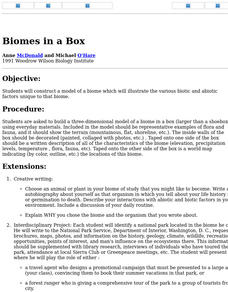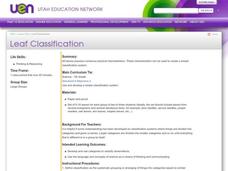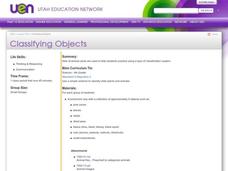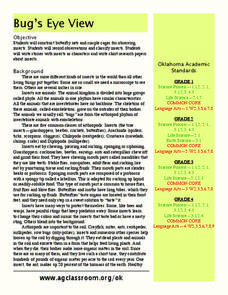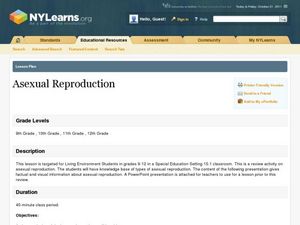Curated OER
Insects: Grasshoppers
Students examine grasshoppers as they practice following instructions. In this biology lesson plan, students identify the characteristics of grasshoppers and the functions of grasshoppers' external body parts.
Curated OER
Biomes in a Box
Students construct a three-dimensional model of a biome which illustrates the various biotic and abiotic factors unique to that biome. They use everday materials to represent the important characteristics of a particular biome and then...
Curated OER
Let's Hit the Slopes!
Young scholars study benthic communities in the Gulf of Mexico and explain their roles. In this investigative lesson students participate in a group activity and study how to calculate and index of biological communities.
Curated OER
Leaf Classification
Seventh graders work together to develop a leaf classification system. In groups, they are given a set of leaves and sort them based on their characteristics. They share their new classification system with the class and answer any...
Curated OER
Cell Theory, Scientists, & Cell Types
In this cells worksheet, students compare the characteristics of eukaryotic and prokaryotic cells. Students describe how different scientists contributed to the cell theory. This worksheet has 6 short answer questions and 1 graphic...
Curated OER
Classifying Objects
Fourth graders work in small groups to sort and classify a variety of objects. They develop criteria for sorting and explain the characteristics they chose for classification. Groups record and share their classifications.
Curated OER
Butterfly Report
In this biology worksheet, students draw or trace an accurate picture of a butterfly. Then they complete the information related to their butterfly's classification and list the habitats where they are likely to be found. Students also...
Curated OER
Humane Science Projects
In this science worksheet, students examine the list of possible science projects. They look for the characteristics that set apart these ideas as humane.
Curated OER
Bug's Eye View
Students explore biology by writing fictitious stories in class. In this insect life lesson plan, students identify many different types of insects in the animal kingdom and the classifications they fall into. Students collect insects on...
Curated OER
Who's Who?
Students explore biology by identifying animals and their environments. In this animal characteristic lesson, students read assigned text about farm animals, how they are raised, and what they are used for in our society. Students view a...
Curated OER
Floristic Relay
Fifth graders identify the role succession plays in the adaptation of our environment. Students identify pioneer and climax species and order habitats in succession. They recognize that different characteristics of species make them...
Curated OER
Let's Go to the Video Tape!
Students examine biological diversity and see how it relates to the concepts of variety and relative abundance. In this investigative lesson students view a video on biodiversity and complete an activity.
Curated OER
Learning Activities: Magic Words
Students use poetry to compare and contrast humans and frogs.
Curated OER
Diversity and Adaptation
Tenth graders explore structure, function and variation among species. Through field observations, lab activities and homework, 10th graders observe and record examples of adaptation and variation.
Curated OER
In the Field with Salamanders
Students observe salamanders, take pictures of them, and classify them into an online format. In this animal classification lesson, students use collection materials and digital camera to photograph and observe salamanders. Students...
Curated OER
Root, Root, Root for the Nutrients
Students observe the growth of a seed, predict what will happen when seeds are planted without soil, and conduct an experiment using a hydroponics system.
Curated OER
Asexual Reproduction
Sixth graders investigate how asexual reproduction produces single-parent offspring. They use plants and yeast to demonstrate vegetative propagation and budding in a laboratory. Students draw five different types of asexual reproduction.
Curated OER
Pollution Solution
Students, after discussing oil pollution, generate solutions to an oil spill.
Curated OER
Cell Division and Differentiation
Tenth graders investigate about mitosis, meiosis, and cell differentiation and their purposes and implications in the development and functioning of multicellular organisms. Students use individual journals and a variety of hands-on...
Curated OER
Lessons of the Lorax
Fifth graders read a story that is about the brown pelicans. Then they use the story narrative in order to apply it to the concept of adaptations in different species. The benefits of certain adaptations is examined.
Curated OER
Understanding Digestion
Young scholars analyze data from their primary literature (textbook) and explore multiple
aspects of digestion by generating alternative or multiple explanations for questions posed during the lesson. This lesson includes a handout...
Curated OER
Patterns and Adaptations in Plants and Animals
Fourth graders conduct research about some of the regions of Texas. They compare plants and animals to identify different adaptations. The statistics of survival rates are measured for changes.
Curated OER
Animal Diversity
Students explore biology by completing science worksheets in class. In this animal anatomy lesson, students read the book The Adventures of Marco and Polo and identify the animals mentioned in it. Students examine a real life animal and...
Virginia Department of Education
The Cell Cycle and Mitosis
What a packed lesson! Provide your class with the opportunity to learn about the cell cycle in several exciting ways. Biologists first learn about the theory behind mitosis, then proceed to view onion tips under the microscope and create...



